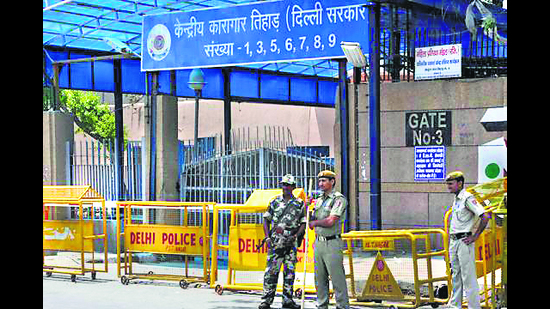Govt rules out separate bail law suggested by SC
The Centre argued that Chapter XXXV (or 35) of the BNSS comprehensively lays down the framework for bail, bail bonds, and related processes.
The Union government has declined to act on the Supreme Court’s suggestion to enact a separate law on bail, asserting that the recent overhaul of criminal laws sufficiently addresses concerns regarding pre-trial detention and related issues.

In an affidavit, submitted in compliance with earlier directions from the Supreme Court, the Centre highlighted the provisions of the Bharatiya Nagarik Suraksha Sanhita (BNSS), 2023, which came into effect in July 2024. Chapter XXXV (or 35) of the BNSS, it argued, comprehensively lays down the framework for bail, bail bonds, and related processes, making a standalone law unnecessary.
“As the provisions relating to bail and bonds in Chapter XXXV of the Bharatiya Nagarik Suraksha Sanita (BNSS), 2023 are considered adequate, there is no proposal to bring a separate law on ‘Bail’...” the affidavit stated.
The chapter provides definitions of terms such as “bail”, “bail bond” and “bond”, and elaborates on the procedures for granting bail, including statutory safeguards for vulnerable groups such as women, minors and the infirm.
The Union government’s stand is significant, as it underscores a broader shift toward codifying reforms within the framework of existing criminal laws, rather than creating standalone legislation. While the Supreme Court has since February 2022 stressed the need for a dedicated bail law to ensure uniformity and accountability in judicial decisions, the government believes the provisions under the BNSS sufficiently fulfill this objective.
The court’s emphatic call for a separate law on bail came at a time when numerous arrests and protracted bail application delays cast doubt on the objectivity and efficacy of the judicial approach to such matters. The apex court has been routinely stepping in to grant bail in cases where the accused have been languishing behind bars for a long period over charges, including those where the maximum punishment is less than seven years in jail. Some of these recent instances included the grant of bail to journalist and fact-checker Mohammed Zubair, who was arrested in connection to his old tweets; those arrested in connection with the Delhi excise policy case, including former Delhi chief minister Arvind Kejriwal; and old and infirm accused such as Varavara Rao and Sudha Bharadwaj in the Bhima-Koregaon case.
The Centre’s response was submitted in an affidavit filed in November 2024 but became public only recently during a hearing before a bench led by justice MM Sundresh. The affidavit was filed in compliance with the Supreme Court’s earlier directives, which sought clarity on the Centre’s plans to draft a standalone bail law, as proposed in the court’s 2022 judgment in the Satender Kumar Antil case. In this ruling, the court urged the government to consider a “Bail Act” to streamline bail processes, reduce unnecessary arrests and prevent prolonged incarceration of undertrial prisoners.
The Centre’s affidavit also provided updates on the implementation of the “Support to poor prisoners” scheme, which seeks to provide financial assistance to undertrial prisoners who cannot afford bail or fines. The scheme, operational since June 2023, involves the creation of empowered and oversight committees at the district and state levels, respectively, to ensure effective disbursal of funds. The ministry of home affairs has allocated ₹20 crore for this scheme over three financial years, coinciding with the 15th Finance Commission cycle ending in 2026, said the affidavit.
However, the affidavit revealed lapses in compliance by some states and Union territories (UTs). While 28 states and UTs have constituted empowered committees, others -- including Bihar, Uttar Pradesh, and West Bengal-- are yet to do so despite repeated follow-ups. Similarly, five states have not opened the required subsidiary accounts to facilitate fund transfers under the scheme. Only eight states have so far drawn funds, benefiting 45 prisoners with a cumulative disbursement of ₹9.13 lakh.
The court’s earlier interventions had called attention to the challenges posed by inordinate pre-trial detentions, which often result from routine arrests and delays in granting bail. The 2022 judgment in Satender Kumar Antil had urged the government to streamline bail provisions to prevent the misuse of arrest powers, particularly in cases where the maximum punishment is less than seven years. The judgment also called for stronger accountability mechanisms for investigating agencies and lower courts, which often fail to comply with procedural safeguards under Sections 41 and 41A of the CrPC or the Arnesh Kumar guidelines.
Senior advocate Sidharth Luthra, assisting the court as amicus curiae, had reiterated the importance of addressing systemic gaps that contribute to the plight of undertrial prisoners. The court at the time sought updates from the Centre on additional measures, such as the establishment of special courts to handle pending cases and the effective implementation of Standard Operating Procedures (SOPs) under the “Support to poor prisoners” scheme.
The Centre’s stand on the bail law raises key questions about the sufficiency of recent legislative reforms to address systemic issues in the criminal justice system, which the top court is expected to deliberate upon during the next hearing on February 12.
All Access.
One Subscription.
Get 360° coverage—from daily headlines
to 100 year archives.



HT App & Website







